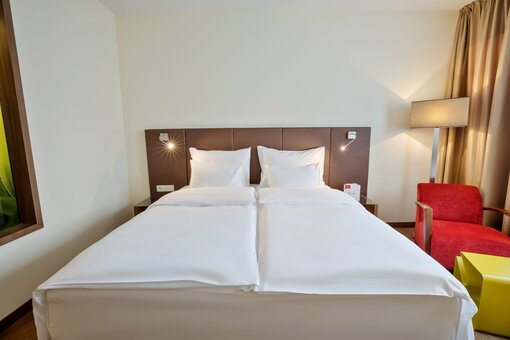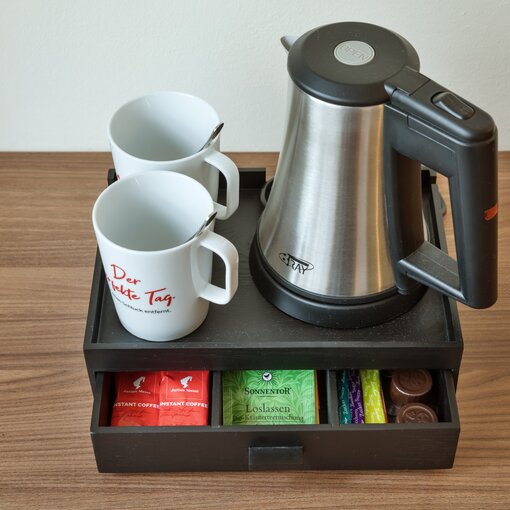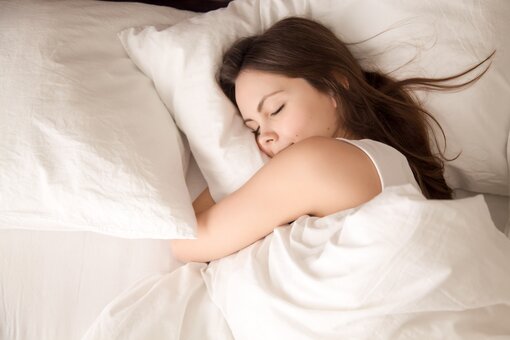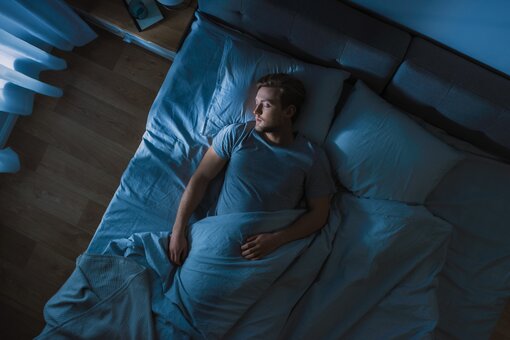Austria Trend Hotels’ measures for a good night’s sleep
New hardware and bedding, hot tea and a delicous breakfast for a pleasant morning: We want your sleeping experience at Austria Trend Hotels to be particularly enjoyable!
At Austria Trend Hotels, sleeping becomes an experience! Because for an all-around perfect stay, it’s not just about having pleasant and eventful days. A quiet and restful night is almost equally as important. Sleep scientists agree: A good night’s sleep is essential for health and wellbeing – and it takes some preparation. That’s exactly why Austria Trend Hotels has come up with effective measures and tips to optimally prepare you for the night.
Restful sleep, a pleasant awakening and a good start into the new day: That’s our heartfelt wish for you!
New hardware and bedding, hot tea and a delicous breakfast for a pleasant morning: We want your sleeping experience at Austria Trend Hotels to be particularly enjoyable!

As an attentive host, we always think about ways to make our guests’ stay even more pleasant. As part of the new Austria Trend Hotels sleeping experience, we’ve not only invested in several goodies for restorative sleep but also in special “hardware” and bedding. New mattresses provide even greater sleeping comfort: High time to give them a try, right?

How about a calming hot beverage as part of your bedtime routine? Celebrate drinking tea as a relaxing ritual before bed! At Austria Trend Hotels, guests can look forward to organic herbal teas with sleep-promoting effects – including cups and an electric kettle for preparing your tea. Bottoms up for a good night’s sleep, even at later hours of the night!

Restorative sleep isn’t the only thing that sets the tone for having an amazing day. An energizing start is essential for that as well. That’s why you’ll find several morning pick-me-ups at Austria Trend Hotels. How about a substantial and healthy breakfast … or better yet, a nice morning walk outside? Fans of jogging might want to explore the most beautiful routes around the hotel – and when they get back, they can stop by at the Runners Desk in the lobby for a welcome refreshment.
Did you know that prior to the industrial revolution, people in large parts of Europe were sleeping in two phases? In at least 13 European languages, the concepts of “first sleep” and “second sleep” – there used to be a longer break from sleep after midnight – were perfectly commonplace? Even Homer, Tolstoi, Balzac and Varga wrote about it.
Ideally, sleep is supposed to last eight hours without interruption. However, this widely held opinion cannot be confirmed by evolutionary biology. Before man invented artificial lights, people were sleeping much more in winter than they did in summer. Whether you sleep for six or ten hours a night is not all that important – what matters is how good you feel on the amount of sleep you’re getting.
“Just a few hours? That’s not normal.” Well, there really is no such thing as “normal” sleep. The pressure of having to go to sleep at a certain time or wanting to finally sleep through the night – those might actually be the reasons why you’re not getting what you want: a goodnight’s sleep. Free yourself from preconceived notions of what it means to have a goodnight’s sleep – the sleeping experience at Austria Trend Hotels supports you in that!

Restorative sleep increases wellbeing and performance. It gives the body time to regenerate, boosts cell rejuvenation, and strengthens the immune system. Melatonin – the so-called “sleep hormone” – is released, which is a process that happens based on circadian rhythms controlled by our “biological clock”.
As a matter of fact: This “biological clock” often gets ignored these days. We live in a world in which everything is geared towards efficiency – even sleep. Are you more of an early bird or a night owl? If you wake up early, your day usually ends earlier as well. But no worries: Whether you prefer to get up and go to bed early or late doesn’t influence the aging process, life expectancy or your productivity during the day. Become friends with your “inner clock” and don’t work against it!
Create your own feel-good atmosphere for a good night’s sleep! The following sleep tips will help you with that:

Dreams are windows to the soul and give us insight into the workings of our subconscious mind. They help us process things that occurred during the day and structure our memories. So why do we usually remember the most trivial of things? There’s no definite answer for that. But one thing’s for sure: We dream almost all night long – especially during REM sleep.

Good to know: Every 90 minutes, we enter a REM phase – a phase that resembles being awake and becomes longer and longer as morning approaches. That’s the reason why we tend to remember the things we dreamt in the morning hours. Research shows the same phenomenon also occurs in other mammals, birds and reptiles. However, dreams hardly make it into our long-term memory unless we write them down right after waking up.
By the way: To remember your dreams at all, you need to be awake for at least one minute. Congratulations to everyone who says they don’t dream: Very deep sleep is the reason for that.